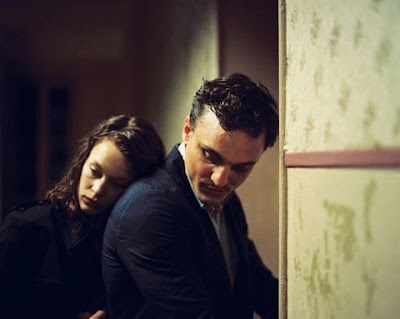Some films demand a high degree of trust from an audience right from the start. That's certainly the case with German director Christian Petzold's Transit, a movie that tries to disorient us in almost every possible way. Petzold makes it unclear when his story is taking place and blurs the national identity of some of his protagonists. In movie terms, Petzold also stirs a pot thick with traces of other movies: Whiffs of Casablanaca and various Holocaust movies ripple through Transit like suddenly-remembered dreams.
Uncertainty serves the movie, which qualifies as an intriguing and perhaps necessary movie of the moment, a look at the dangers of fascism and how the arrival of a new Holocaust -- in this movie called "a cleansing" -- might impact the lives of individuals forced into dangerous games of deception.
The movie also asks a provocative question: How might love look in such a roiled political climate?
Petzold, who wrote the movie's screenplay, bases his story on a 1944 novel by the German/Jewish writer Anna Seghers, dropping the author's tale into what seems (and I emphasize the word "seems") like the present. Whatever the time period, various people are trying to outrun a fascist government that apparently has invaded France and plans to eliminate those parts of the population it deems unworthy.
Georg (Franz Rogowski), the movie's main character, travels from Paris to Marseilles where most of the movie takes place. Georg hopes to escape death by obtaining papers that will allow him to emigrate to Mexico. To do this, Georg assumes the identity of a writer who recently committed suicide in Paris.
In Marseilles, Georg meets the writer's wife (Paula Beer), a woman who doesn't yet know that she's a widow. Beer's Marie has taken up with a physician (Godehard Giese), a doctor who's deeply conflicted about escaping France. If he accepts a foreign post that he's been offered, he thinks he'll be betraying Marie, with whom he's fallen in love.
For her part, Marie can't obtain the necessary papers to leave France until her husband turns up, which we know isn't about to happen.
Georg also becomes entangled in the lives of a North African immigrant (Maryam Zaree) and her needy young son (Lilien Batman). Absent a father, the boy desperately wants a man in his life. Georg becomes increasingly torn. Should he head for the hills with the boy and his mother or pursue his own safety in Mexico?
Meanwhile, the fascist occupation moves inexorably toward Marseilles, a prospect that sustains a mood of danger and desperation.
As you might already have guessed, the experience of watching Transit -- beautifully filmed by cinematographer Hans Fromm -- can be confusing. Petzold creates an environment in which characters and audience become disoriented. Petzold asks us to go with the flow of his movie, believing that by the end, we'll know enough to make sense of what we're seeing. That's what I meant by my earlier mention of "trust."
It's worth noting some of the things Petzold doesn't do as he allows an unsettling vagueness to settle over everything. He never refers to Nazis, makes sure that the occupation of France feels murky enough to create doubt and never explains the movie's mixture of period and contemporary details.
Transit sometimes overdoes its lack of specificity, but Petzold's mix of plot and detail evoke both past and present while alerting us to the ways in which oppressive regimes ravage lives.
The gamble mostly pays off; Transit reminds us that no time is immune from disruptive dangers and that when things fall apart, finding a clear pathway to safety will be dauntingly difficult and morally challenging.

No comments:
Post a Comment